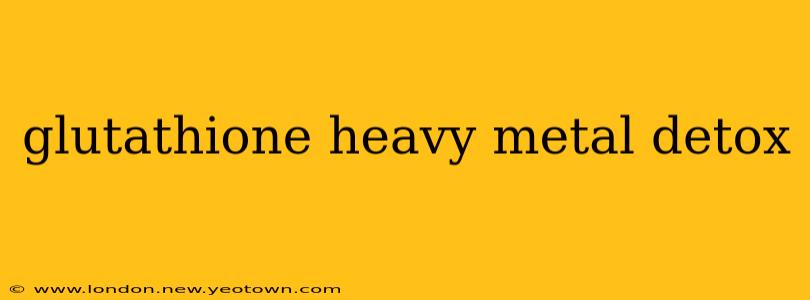Imagine your body as a bustling city. Every day, it's processing millions of transactions – digesting food, fighting off infections, and even dealing with environmental toxins. Among these toxins are heavy metals, insidious invaders that can accumulate over time, causing a range of health problems. Enter glutathione, your body's very own, naturally occurring detoxification superhero. This remarkable molecule plays a crucial role in ridding your system of these harmful heavy metals, acting as a powerful shield against their damaging effects.
But how exactly does this tiny molecule achieve such a monumental task? Let's delve into the fascinating world of glutathione and its heavy metal detox capabilities.
What is Glutathione and Why is it Important for Detoxification?
Glutathione, often abbreviated as GSH, is a tripeptide – a small protein molecule made up of three amino acids: cysteine, glycine, and glutamic acid. It's produced naturally in your liver and plays a vital role in numerous bodily functions, including immune response, protein synthesis, and, most importantly for our discussion, detoxification.
Think of glutathione as a master conductor, orchestrating a symphony of detoxification processes. It doesn't directly grab hold of heavy metals and whisk them away; instead, it acts as a crucial cofactor in various enzymatic reactions that facilitate the elimination of these toxins. It's a vital component of several detoxification pathways, helping to neutralize harmful substances and prepare them for excretion from the body.
How Does Glutathione Help with Heavy Metal Detoxification?
Glutathione's role in heavy metal detoxification is multifaceted. It primarily works through its role in:
-
Reducing oxidative stress: Heavy metals can trigger oxidative stress, a damaging imbalance in the body's delicate antioxidant system. Glutathione acts as a powerful antioxidant, neutralizing these damaging free radicals and protecting cells from heavy metal-induced damage.
-
Supporting the glutathione-S-transferase (GST) enzyme system: GST enzymes are essential for conjugating (attaching) heavy metals to other molecules, making them more water-soluble and easier to eliminate through urine or stool. Glutathione acts as a crucial co-substrate for these enzymes, ensuring their efficient functioning.
-
Chelation: While not directly a chelator itself, glutathione supports the chelation process by indirectly aiding the function of other chelating agents. Chelation involves binding to heavy metals, making them less reactive and more easily removed from the body.
Does Glutathione Help with Mercury Detox?
Yes, glutathione plays a significant role in mercury detoxification. Mercury is a particularly dangerous heavy metal, capable of causing serious neurological damage. Glutathione's antioxidant and enzymatic support aids the body's natural processes for eliminating mercury, minimizing its harmful effects.
What About Lead Detoxification?
Similarly, yes, glutathione assists in lead detoxification. Lead, another potent neurotoxin, can accumulate in the body, impacting various organ systems. Glutathione's involvement in reducing oxidative stress and supporting the GST enzyme system helps mitigate the damaging effects of lead exposure.
Can I Increase My Glutathione Levels Naturally?
Maintaining optimal glutathione levels is key to supporting your body's natural detoxification processes. Several strategies can boost your glutathione production naturally:
-
Eat a balanced diet rich in sulfur-containing amino acids: These are the building blocks of glutathione, so consuming foods like cruciferous vegetables (broccoli, cauliflower), eggs, and lean meats can contribute to increased glutathione production.
-
Consume foods rich in antioxidants: Protecting glutathione from depletion is crucial. Antioxidant-rich fruits and vegetables help to maintain glutathione's effectiveness.
-
Manage stress: Chronic stress depletes glutathione levels. Incorporating stress-reduction techniques such as meditation, yoga, or spending time in nature can help.
-
Get enough sleep: Adequate sleep is essential for optimal bodily functions, including glutathione production.
What are the Risks Associated with Glutathione Supplementation?
While generally considered safe, glutathione supplementation does carry some potential risks. Some individuals might experience mild gastrointestinal side effects like nausea or diarrhea. Furthermore, it's crucial to consult with a healthcare professional before initiating any supplementation, particularly if you have pre-existing medical conditions or are taking other medications.
Glutathione is a vital component of your body's intricate detoxification system. While it can't magically erase the damage done by heavy metals overnight, supporting its natural production and function through lifestyle choices and, when appropriate, targeted supplementation can be a significant step towards maintaining optimal health and well-being. Remember, this information is for educational purposes and shouldn't be construed as medical advice. Always consult with your healthcare provider before making any changes to your diet or supplementation regimen.

